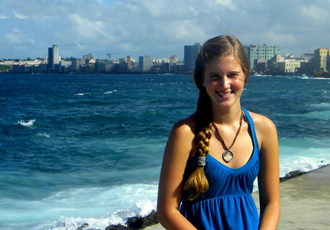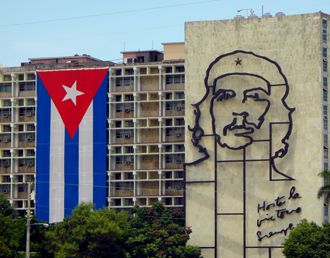Cuba: A metaphor for discovery
Cuba is the greatest contradiction and the most honorable truth. I won't say that I loved it, but I will say that it has my heart. During my semester in Cuba in fall 2011, through a partnership with Tulane and the University of Havana, I studied literature, culture, art history, film and linguistics in the Facultad de Artes y Letras.

Senior Michaela Gibboni enjoys a quiet moment in Havana. (Photos from Michaela Gibboni)

A huge image of revolutionary Che Guevara is displayed on this Havana building.
Also, I took a course from Stone Center for Latin American Studies adjunct professor Annie Gibson.
I give Cuba stories like a veteran gives war stories: hesitant, muted, overwhelmed and always concluded abruptly with the feeling that the listener simply had to be there. How can you explain Cuba to somebody who has never been? The answer is, you can't. I can only explain what Cuba meant for me.
Cuba is complicated. In the most crumbling street lies the most beautiful building. The simplest street pizza is the most delicious lunch. At the end of a long and unorganized line, the best ice cream awaits. A lesson on literature is also a lesson on politics. A lesson on politics is also a lesson on education. A “street person” is not necessarily a bad thing.
Commercialism is dissidence. Commercialism is also communism. The best food is the kind pulled from the ocean and eaten while barefoot on the beach. Free food doesn't always mean full stomachs. Racism still exists in a country without race. Island living doesn't always mean happiness, and isolation doesn't always mean oppression.
For me, Cuba is more of a metaphor than a country. Cuba is a wide-mouthed vowel and a skipped consonant. Cuba is the din of a 1954 Chevy with a Toyota motor. Cuba is guava ice cream made with powdered milk. Cuba is protest. Cuba is revolution. Cuba is music. Cuba is desire. Cuba is la lucha. Cuba is a love letter. Cuba is life.
Michaela Gibboni is a senior at Tulane, majoring in communication and Spanish.
